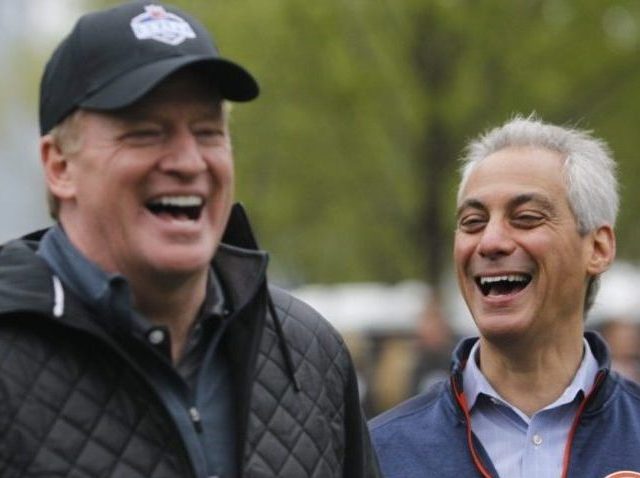Roger Goodell entered the NFL from the rougher world of politics. Now he takes football back from where he came.
NFL players and owners meet on Tuesday in New York City to discuss politics and protest.
An initial 10 a.m. meeting features players—including Eric Reid, the San Francisco 49ers safety who knelt alongside former teammate Colin Kaepernick—owners, and union officials discussing how the NFL can lend its weight to the political causes championed by its athletes. A 1 p.m. meeting of owners specifically looks at the national anthem.
The league seeks to “move on,” to use the commissioner’s language, from the pregame sideline protests. But it rules out requiring its players to respect the flag as a condition of employment the way it forbids them from wearing certain brands of clothing at its events, bearing arms on its properties, or even listening to music on certain headphones on its fields.
Since Kaepenick, uninvited to the meeting despite living in Manhattan, first sat for the “Star Spangled Banner” before a 2016 preseason game, the NFL has watched its television ratings free fall. The league lost seven percent of its home audience last season. A third of the way through this season, the league again sliced seven percent off its viewership.
The Sunday afternoon exodus from the living room proves devastating for the league’s broadcast partners. Citing weak NFL ratings, Suisse Credit recently downgraded earnings expectations for Twenty-First Century Fox and CBS.
Rather than run from politics in an effort to attract the audience running from it, the NFL embraces activism. The league’s spokesman Joe Lockhart, himself a Democratic Party insider who served as President Bill Clinton’s press secretary and recently sold his house to President Barack Obama, announced an effort to link football to causes. “We are proud to be able to work with our players to highlight these issues to really put focus on the issues and how the game and the NFL and our players bring communities together when we are divided,” he told journalists on Monday. To that end, the league endorsed the Sentencing Reform and Corrections Act that day. This followed the commissioner, and several high-profile owners including Robert Kraft of the New England Patriots, publicly, and harshly, criticizing President Donald Trump after he called for the NFL to kick out of the league players who refuse to rise for the anthem.
The gridiron becoming a soapbox strikes many apolitical fans as a non sequitur. But anyone following the life of Commissioner Goodell grasps how, at least from his perspective, this indeed does follow. His father, Charles Ellsworth Goodell, became a U.S. congressman and senator, coming to power in ghoulish fashion after the deaths of Representative Daniel Reed and Senator Robert Kennedy. His departure from public life came about in similarly unusual circumstances. In the upper chamber, despite his Republican affiliation, Goodell pushed liberal issues, which led to such dissatisfaction among conservatives that they ran William F. Buckley’s brother James against him in 1970. Conservative Party nominee Buckley’s campaign resulted in the unexpected outcome of a third-party candidate winning election to the United States Senate.
Did the vanquished senator’s 11-year-old kid ever forget who fired his father from his job?
In 1970, Charles Ellsworth Goodell ran on the slogan, “He’s too good to lose.” Forty-seven-years later, imagining football as too big to fail, and the NFL’s politics as too decent not to proselytize, Roger Goodell’s league finds itself in a position not unlike Roger Goodell’s father. As it congratulates itself on its enlightened social stances, the NFL sees its troglodyte constituents rush for the exits.
Politicians, teams, and, yes, sports leagues conceiving themselves as “too good to lose” often do lose but good.

COMMENTS
Please let us know if you're having issues with commenting.